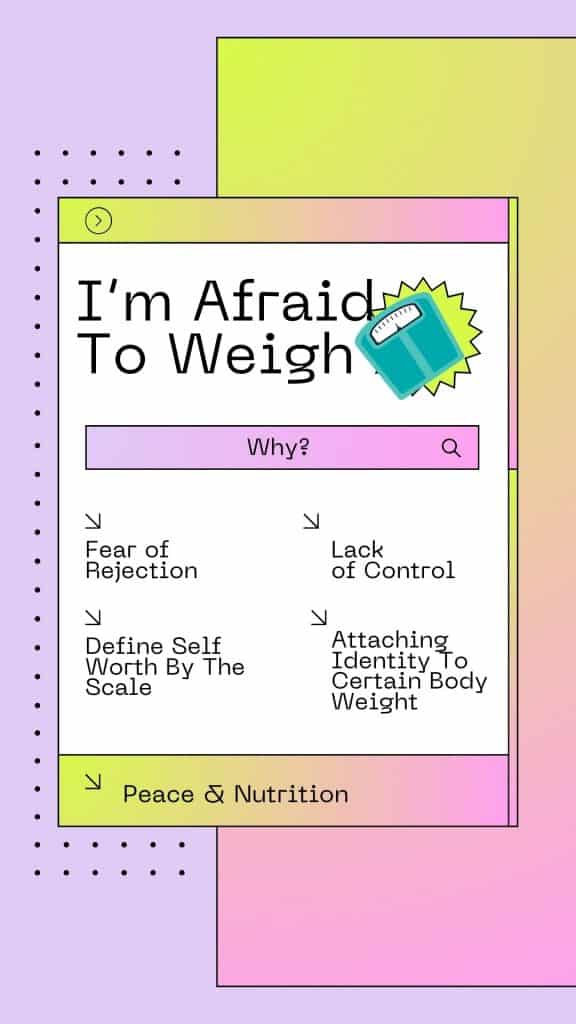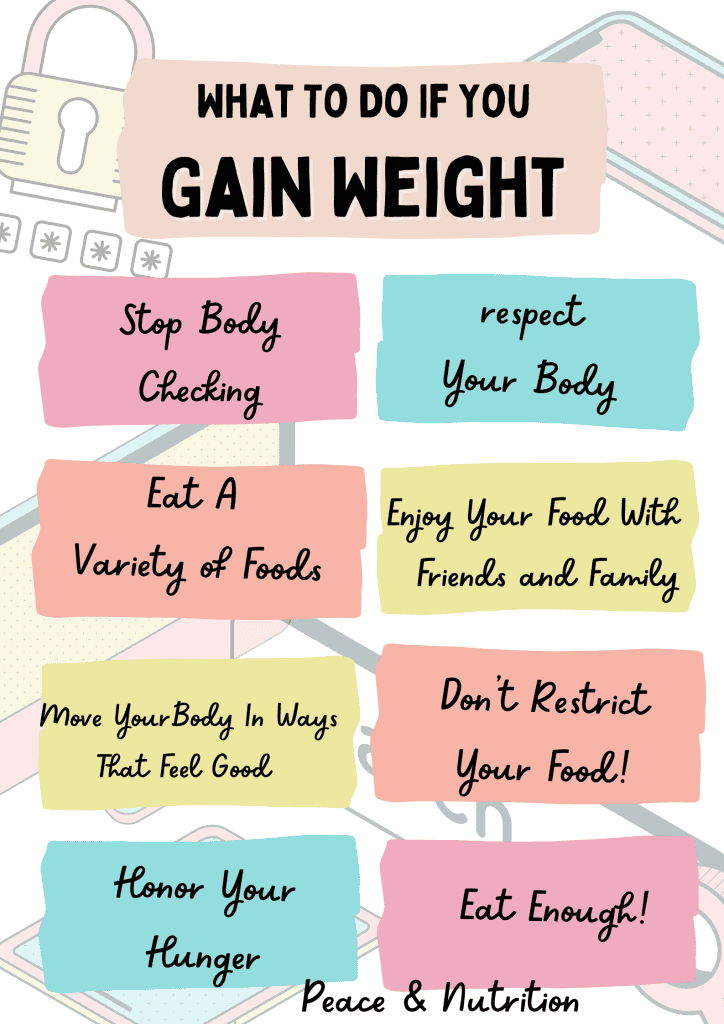Table of Contents
Last updated on August 21st, 2025 at 08:14 pm
Overcoming the Fear of Gaining Weight is a crucial step in eating disorder recovery and healing your relationship with food and your body. Gaining weight might be a deeply rooted fear for you, because you may feel you will hate your body if you gain weight. This fear often stems from societal pressures, past experiences, or internalized beliefs about worth and appearance.
Learning to release it can feel overwhelming, yet it opens the door to true freedom, where nourishment, self-care, and body trust replace anxiety and restriction. Clinging to weight fears often leads to restrictive eating, compulsive exercise, or other disordered behaviors, making lasting recovery difficult. Letting go of this fear allows you to nourish your body consistently and trust its natural needs.
In this guide, we’ll explore how weight gain fear develops, how it impacts your eating disorder recovery, and practical ways to move toward peace with your body.
What Does Fear of Gaining Weight Really Mean
The fear of weight gain goes beyond simple discomfort with body changes, it is often deeply rooted in beliefs about self-worth, control, and identity. For many, gaining weight may be associated with feelings of failure, judgment from others, or a loss of safety in a world that glorifies thinness. This fear can trigger intense anxiety, leading to restrictive eating, compulsive exercise, or other harmful behaviors to avoid weight changes. Understanding that this fear is not just about numbers on a scale, but about underlying emotions and learned beliefs, is the first step toward healing.
You may also be afraid to gain weight because you have experienced or seen others that live in fat bodies exposed to bullying and fatphobia. Society has taught us all that thin bodies are better bodies in the media, healthcare and educational settings. If you are afraid to gain weight, it’s not really because you are afraid of who you might be when your body changes. It’s because you are afraid of what your body might mean to society if it is bigger.

How Fear of Weight Gain Develops
Fear of weight gain often develops through a combination of personal experiences, societal influences, and internalized beliefs about body image. Cultural messaging, such as the glorification of thinness and diet culture, reinforces the idea that smaller bodies are more valuable or worthy. Fat bias is extremely prevalent in western society. However, this does not make gaining weight wrong or unhealthy. It simply makes the systems in which you exist in are oppressive. And while this can make the experience of gaining weight difficult, it doesn’t make it bad or wrong.
Personal experiences, such as weight-related teasing, medical comments, or praise for weight loss can strengthen the belief that you should always be in the thinnest body possible. Often times this is fuel on the fire for developing an eating disorder and keeping it alive. Over time, these external messages become internal fears, making weight gain feel like a threat to identity, self-esteem, or social acceptance. You are also told that weight is something you have complete control over, and thus it is your responsibility to remain thin at all time. This can heighten the fear of weight gain because you believe you hold the burden of responsibility if your body isn’t perfect according to social standards.
Some social reasons weight gain fear happens is:
- Medically irrelivant BMI standards used as the “hallmark of health” that scrutenize fat bodies
- Seeing bullying of fat bodies in the media
- Job and housing discrimination for people in fat bodies
- People constantly commenting on your weight or other people’s weight
- Childhood toys (such as barbie) that glorify thin white bodies
- Research studies that are based on fat bias to verify their objective
Dangerous Behaviors Associated With Weight Gain Fear
Fear of weight gain can harm you physically, mentally, and emotionally. Physically, it may lead to restrictive eating, over-exercising, or purging behaviors, which can cause nutrient deficiencies, hormonal imbalances, weakened immunity, and long-term organ damage. Mentally, the constant anxiety and obsession over body changes can fuel low self-esteem, depression, and obsessive-compulsive tendencies around food and weight.
Here are some of the key ways weight gain fear is dangerous:
- Medical Risks
Food restriction or compensatory behaviors such as purging or laxative abuse in efforts to maintain your weight can lead to osteoporosis, heart complications, digestive problems, and hormonal imbalances. - Increased Risk of Eating Disorder Relapse
Holding onto weight fears makes it harder to fully recover and increases the likelihood of falling back into harmful patterns - Persistent Anxiety and Mental Distress
Living in constant fear of body changes can cause obsessive thoughts, anxiety disorders, or depression. It can also cause obsessive weighing or body checking - Disconnection from Body Signals
Fear of weight gain often overrides hunger, fullness, and satisfaction cues. This can lead to mistrust of your body. It might make it difficult to get your hunger cues back or could cause extreme hunger because your body is worried it might not get food in efforts to lose weight - Loss of Quality of Life
Fear of weight changes can lead to avoiding social events, travel, and joyful experiences due to body concerns limits emotional well-being and personal growth. Feeling anxious or depressed can come along with fear of weight changes leaving you disentrested in activities you used to enjoy

Why Overcoming The Fear of Weight Gain Is Critical In Recovery
You cannot recover from an eating disorder without overcoming your fear of weight gain. Even if your body does not change in eating disorder recovery, you will at some point in your life experience body changes. When this happens, you need to be mentally prepared so you do not experience an eating disorder relapse. Letting go of the fear of weight gain does not necessarily mean you WILL gain weight. It means that you are comfortable letting your body be whatever size it needs to be while eating intuitively, properly nourishing, not having guilt around food and not compulsively exercising.
A fear of gaining weight can produce just as much if not more anxiety than the constant desire to lose weight in eating disorder recovery. It can prevent you from taking the steps you need to take in recovery to reduce your eating disorder behaviors. It can also lead to binge restrict cycles if you start to notice changes in your body during the weight restoration phase.

I’m Scared To Weigh Myself
Fear of stepping on the scale often stems from the emotional weight we attach to the number it shows. For many, that number feels like a judgment defining worth, success, or failure. If you’ve experienced body dissatisfaction, body dysmorphia, disordered eating, or a history of dieting, the scale may feel like a source of anxiety, triggering shame or fear of loss of control. It can also represent deeper worries about weight gain, body changes, or how others perceive you. Understanding that the scale measures only body mass, not health, happiness or value is key to releasing its power over your self-image.
Sometimes it’s a good idea to not weigh yourself at all if you are in the early stages of recovery or if you find yourself obsessed with weighing. While avoiding the scale can be important in early recovery, there are times when weighing yourself under the guidance of a treatment team can support progress. It can be an opportunity to challenge fear-based thoughts and build tolerance to body changes in a safe, controlled way. When done with professional support, rather than as a form of self-judgment, stepping on the scale can shift from a source of anxiety to a tool for healing and body trust.

You might be scared to weigh yourself because:
- You’re afraid if you’ve gained weight you won’t be able to stop gaining weight
- You have attached yourself to a certain number on the scale as a part of your identity
- If your weight is higher than the last time you checked, you may feel like a failure
- If your weight is the same or higher than your last check, you may feel like you’re not in control of your body
Tips To Stop Weight Gain Anxiety
Overcoming weight gain anxiety is a gradual process that involves mindset shifts, practical strategies, and professional support. A key first step in challenging fear-based thoughts is to notice when your mind equates weight gain with failure or shame, and replace these beliefs with evidence-based reminders that your health and self-worth are not defined by a number on the scale.

Focusing on nourishment rather than numbers can also help. Prioritize eating to fuel and care for your body rather than to control your weight, trusting that your body can regulate itself naturally. Gradual exposure to feared situations, such as trying new foods, eating balanced portions, or stepping on the scale under professional guidance, helps build tolerance and reduce avoidance. Practicing body neutrality and self-compassion shifts your focus from appearance to function, allowing you to appreciate your body for what it does rather than how it looks.
Stop the fear of weight gain by:
- Tracking the number of times you weigh and commit to reducing this number each week.
- Putting the scale away or get it out of the house if possible
- Tracking other body-checking measures and committing to reducing weekly
- Covering mirrors if you’re checking yourself in them frequently
- Getting rid of calorie-counting apps
- Practicing food neutrality
- Having activities to do to reduce stress rather than the scale such as a game or knitting
- Using body-positive affirmations
- Journaling using body-positive journal prompts
- Celebrate non-scale victories
- Diet Culture is Toxic - December 22, 2025
- I Don’t Eat Anything White - December 11, 2025
- I Wish I Had More Control With Food - November 18, 2025